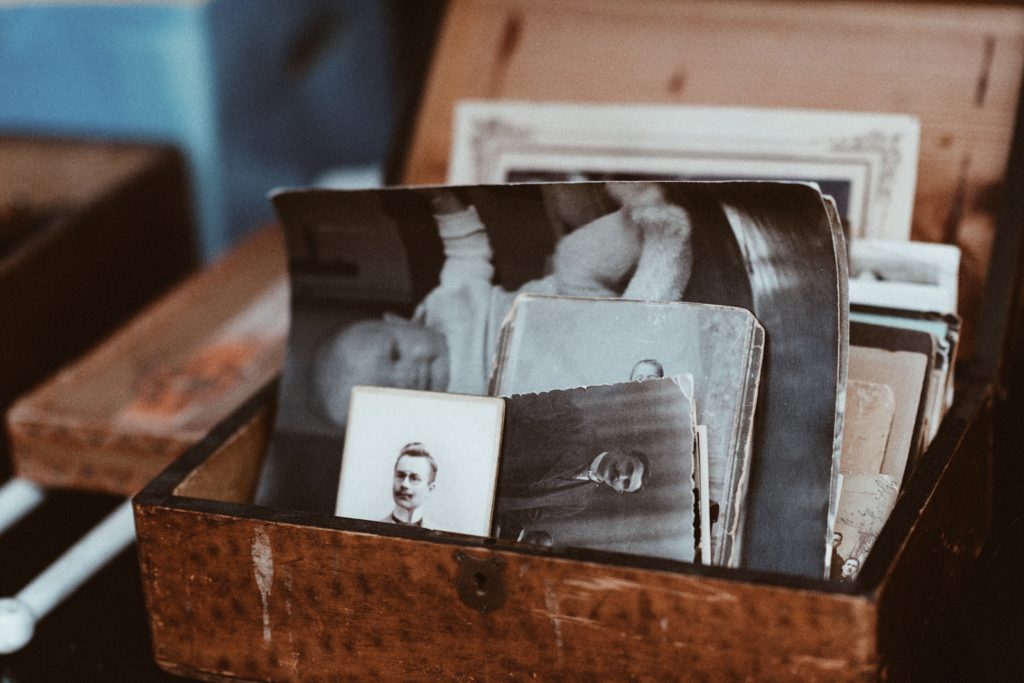Discovering Family Histories and Mysteries
Jan Whitaker
Ed: This article is based on a presentation that Jan Whitaker gave to the Monthly Meeting on October 2 2019. If you’d like to see the full presentation please go to https://tinyurl.com/y2v5q5c4

Why do genealogy?
- Discover awesome family stories: the highs, the lows and the heartbreaks
- You’ll be in awe of your pioneering ancestors
- Find the bad boys and girls in your family
- You’ll find long lost cousins all around the world
- Finding old family photos is seriously cool
- The thrill of the hunt, and of course, the find
- It’s a jigsaw waiting to be solved
- Research 24/7 in your pyjamas
- You’ll make so many new friends
My motivations
- Curiosity
- Can easily access information from “back home”
- “Back home” has extended to places I never expected
The motivations of others (from a Facebook post)
- Love of family stories and wondering about the people in family photos
- Why did people move?
- Love of a good mystery
- Love of history
- Brings together many interests, e.g. history, geography, biology, writing, solving puzzles etc.
- Looking for lost family
- Pending retirement, looking for a hobby
Where do you look for your family information?
- Major Genealogy Conglomerates
- Family Search – free, many databases
- Ancestry (.au) – fee, more databases and ancillaries (Newspapers.com for extra $)
- Others
- Find My Past – UK focus ($)
- My Heritage – European Focus ($)
- All of them overlap
- Some have .au versions
- Government record and archive services (free and $)
- national and state libraries, agencies, and departments
- People
- family, genealogists (free and $), librarians, historical societies
- amateurs like us: interest groups, classes
- Facebook groups
- genealogy general and locales for local information access
Australian sources
- Trove for newspapers and MUCH more: https://trove.nla.gov.au/
- State Library of Victoria:
http://www.slv.vic.gov.au/help/family-history-faq - National Library Australia:
https://www.nla.gov.au/research-guides/family-history - Family History Connections (Blackburn)was AIGS (membership or per day fee)
https://www.familyhistoryconnections.org.au
Choosing a genealogy service
- MOST important: Geographic coverage – do your research
- Services provided – databases and sizes and organising (tree creation), personal storage
- Budget
- Free
- Half-price sales, or buy one month to try
- Alternate access: Libraries and family history centres
- Library edition of subscription services
- Books, microfilm, microfiche, family and location histories
What is a record?
- “Official” information about a person or event
- Name, date and place minimum
- Held by a government bureau or church so it can be verified
- Physical or digital
- Common records: census, land, tax, birth, death, marriage, wills, military service, immigration
What is an index?
- Information transcribed from a record
- An alphabetical listing of records kept by the original source (think a telephone directory or volume index or book index)
- Can introduce errors because the transcriptions are secondary
- Don’t rely just on index/transcribed information
What to save from and about a record?
- The index information AND the ACTUAL Record
- Citation information so you can find it again
- Try different tools provided on the website – download v print v save
- TIP: Print in Ancestry tools provides option to capture record AND citation info
- Set up a local file system that makes sense – surname per folder is a good start
Where do you keep your tree and information?
- Why: Structure and sharing ancestors and research – To find what you collect!
- Online provides access from other locations (libraries, traveling)
- Offline allows for local control and protection from disappearing records
- Family Search is a common world tree; Ancestry is yours, public or private
- Best: online and offline with a back-up
How do you keep your tree and information?
- Family Treemaker (414!)
- Ancestry (259)
- Family Search
- Roots Magic (224)
- Legacy (143)
- more than one (74)
- Reunion
- Ancestral Quest
- The Master Genealogist
- Brother’s Keeper
- Mac Family Tree
- My Heritage
- Family Tree Builder
- Word and/or Excel
- Family Historian
- Paper
- Heredis
- GRAMPS (open source)
- Clooz
- FTAnalyzer
- Ages
- Wikitree
- Zoompast
- Google Docs spreadsheets
Fit For Purpose
- “Ancestry to create files, Family Treemaker for backup and publishing”
- “Reunion for my laptop and main tree but backups on Ancestry and Family Search”
- syncing between online and local
- Free versions available to try out (they have long learning curves, so don’t expect to learn all the features)
Further help for ‘doing’ genealogy
- The service you subscribe to: videos, webinars, guides and wikis
- How to use the service AND how to do research on specific topics
- In person groups and online networks
- Melbourne PC User Group SIGS
Melbourne PC User Group SIGS
- 5 SIGS are specifically focused on genealogy and family history
- 1 has added a DNA specific meeting
- Melbpc Yammer has a genealogy discussion forum
- Individual general SIGs may have talks on this topic occasionally
- Genealogy East SIG, 3rd Sunday of the month, 12.30-2.30pm, Vermont South
- North East Genealogy SIG, 1st Wednesday of the month, 10-12noon, Heidelberg
- Mornington Family History SIG, 3rd Monday of the month, 1.30-4.30pm, Mornington
- Mornington Peninsula SIGAdvanced DNA,
4th OR 5th Wednesday of the month,2-4pm - Yammer Genealogy Discussion Forum, all day, every day
Other Help Sources Online
- Familysearch Wiki – 90,000 articles (90,699), International help
https://www.familysearch.org/wiki/en/Main_Page - Cyndi’s List
Categories, Free and fee sites
https://cyndislist.com/ - Facebook – LOTS!
The Genealogy Squad – 20,000+ members
Local Facebook groups
Specific services: translation, photo identification, families